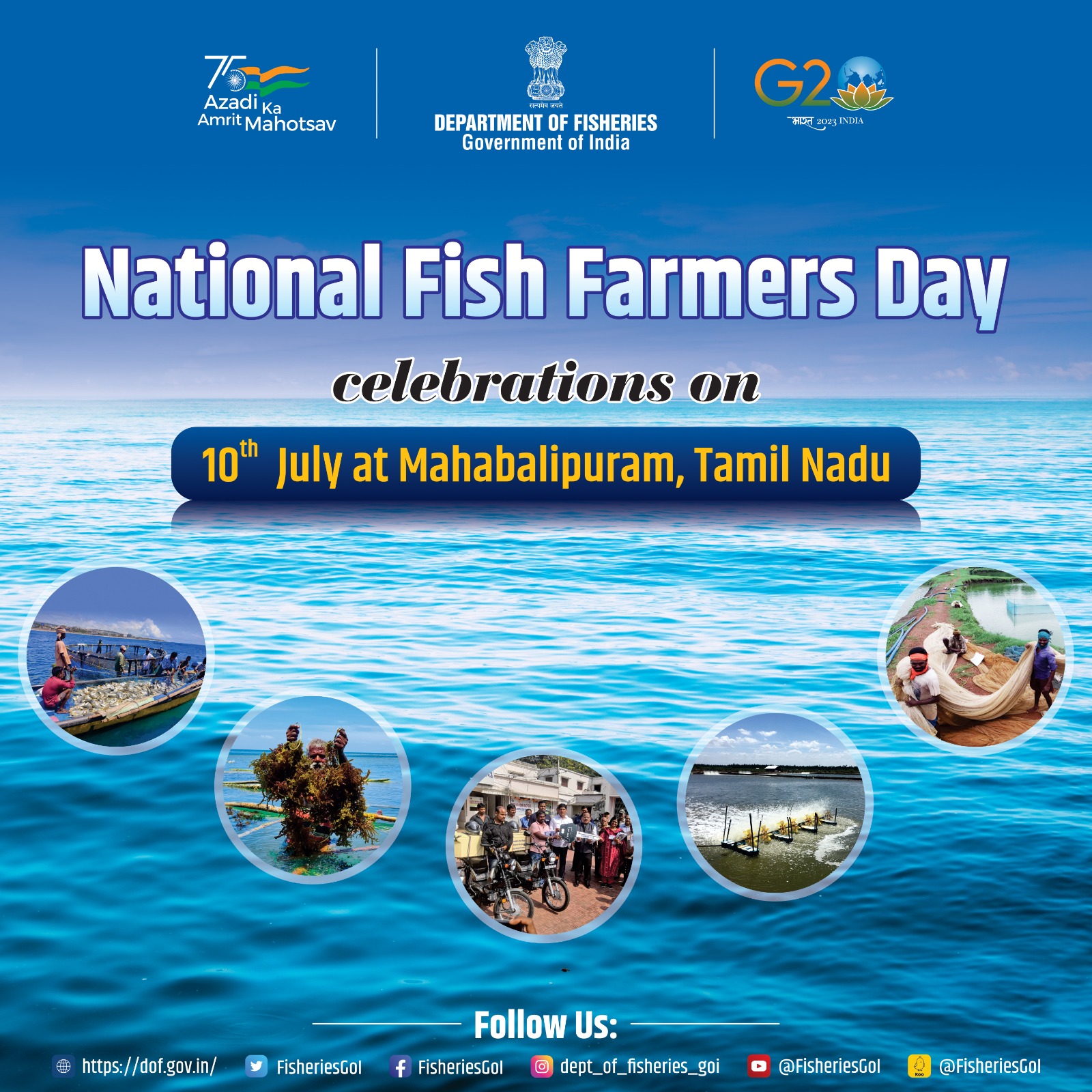National Fish Farmers Day
National Fish Farmers Day
About National Fish Farmers day
 The National Fish Farmers day is observed every year on 10th July to demonstrate solidarity with all fisher folk, fish farmers and concerned stakeholders throughout the country.
The National Fish Farmers day is observed every year on 10th July to demonstrate solidarity with all fisher folk, fish farmers and concerned stakeholders throughout the country.
This annual event is celebrated to commemorate Professor Dr. Hiralal Chaudhury and his colleague Dr. Alikunhi for their contribution in achieving the successful induced breeding of major carps on 10th July,1957 at Angul in Odisha for the first time in the country. This pioneering work of induced breeding over the years has transformed the growth of aquaculture sector from traditional to intensive aquaculture practices and led to success of modern aquaculture industry.
On this occasion, various activities such as seminars, workshops, exhibitions, and interactive sessions are organized across the country to disseminate knowledge, share experiences, and foster collaboration among stakeholders. Experts and professionals from the fisheries sector provide insights into the latest developments, research findings, and emerging trends in aquaculture.
The day is also celebrated as National Fisheries Development Board (NFDB) Foundation Day.
Aim
National Fish Farmers Day is celebrated with an aim:
- To recognise the accomplishments and contribution of fish farmers, aquapreneurs (entrepreneurs in the water sector) and fisherfolks in the growth of the fisheries sector in the country.
- To draw attention to changing the way the country manages fisheries resources to ensure sustainable stocks and healthy ecosystems.
2024 celebrations
National Fish Farmer’s Day 2024 is an opportunity for the entire nation to recognize the immense contributions of fish farmers and their commitment toward sustainable aquaculture. By embracing responsible practices and harnessing the potential of the fisheries sector, we can ensure a prosperous future, enhance food security, and contribute to the overall development of the nation.
About National Fisheries Development Board
The National Fisheries Development Board (NFDB) was established in 2006 as an autonomous organization under the administrative control of the Department of Fisheries, Ministry of Fisheries, Animal Husbandry & Dairying, Government of India to enhance fish production and productivity in the country and to coordinate fishery development in an integrated and holistic manner.
A wide range of fishery development activities viz., intensive aquaculture in ponds and tanks, culture based capture fisheries in reservoirs, Coastal Aquaculture, Mariculture, Sea Weed cultivation, establishment of infrastructure, fishing harbours and fish landing centres, fishing dressing centres and solar drying of fish, domestic marketing, deep sea fishing and tuna processing, ornamental fisheries, trout culture, artificial reefs technology upgradation and capacity building of fishermen and fish farmers are being supported through the State Governments/Implementing agencies.
To know more about NFDB, click here.
Toll free number : 1800-425-1660 (Open: Monday - Friday ( 9:30 AM - 6:00 PM ))
Department of Fisheries, Ministry of Fisheries, Animal Husbandry & Dairying
The Department of Fisheries is one of the two Departments under the Ministry of Fisheries, Animal Husbandry & Dairying. It came into existence with effect from 05.02.2019 through carving out Fishery Division from the erstwhile Department of Animal Husbandry, Dairying and Fisheries.
The Department is responsible for matters relating to formulation of policy and schemes relating to Development of Inland , Marine and Coastal Fisheries and Fishery Institutes namely
- Fishery Survey of India Mumbai
- Central Institute of Fisheries Nautical and Engineering Training (CIFNET), Kerala
- Central Institute of Coastal Engineering For Fishery (CICEF), Bangalore
- National Institute of Fisheries Post Harvest Technology and Training, (NIFPHATT), Kochi
- National Fisheries Development Board (NFDB), Hyderabad
- Coastal Aquaculture Authority, Chennai.
To know more about Department of Fisheries, click here.
Schemes for fisheries sector
- Pradhan Mantri Matsya Sampada Yojana
- Fisheries and Aquaculture Infrastructure Development Fund
- Blue Revolution: Integrated Development and Management of Fisheries
- Fish Market Price Information System
- Group Accident Insurance Scheme (GAIS) under PMMSY scheme
Related resources
Last Modified : 7/2/2024
This topic provides information about the State of...
This topic provides information about Biofloc Fish...
Provides information about World Fisheries Day - 2...
Provides the success story of a Women Fish farmer ...
